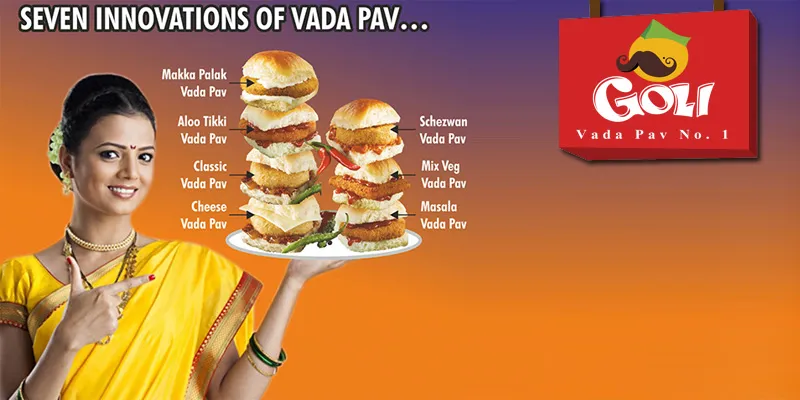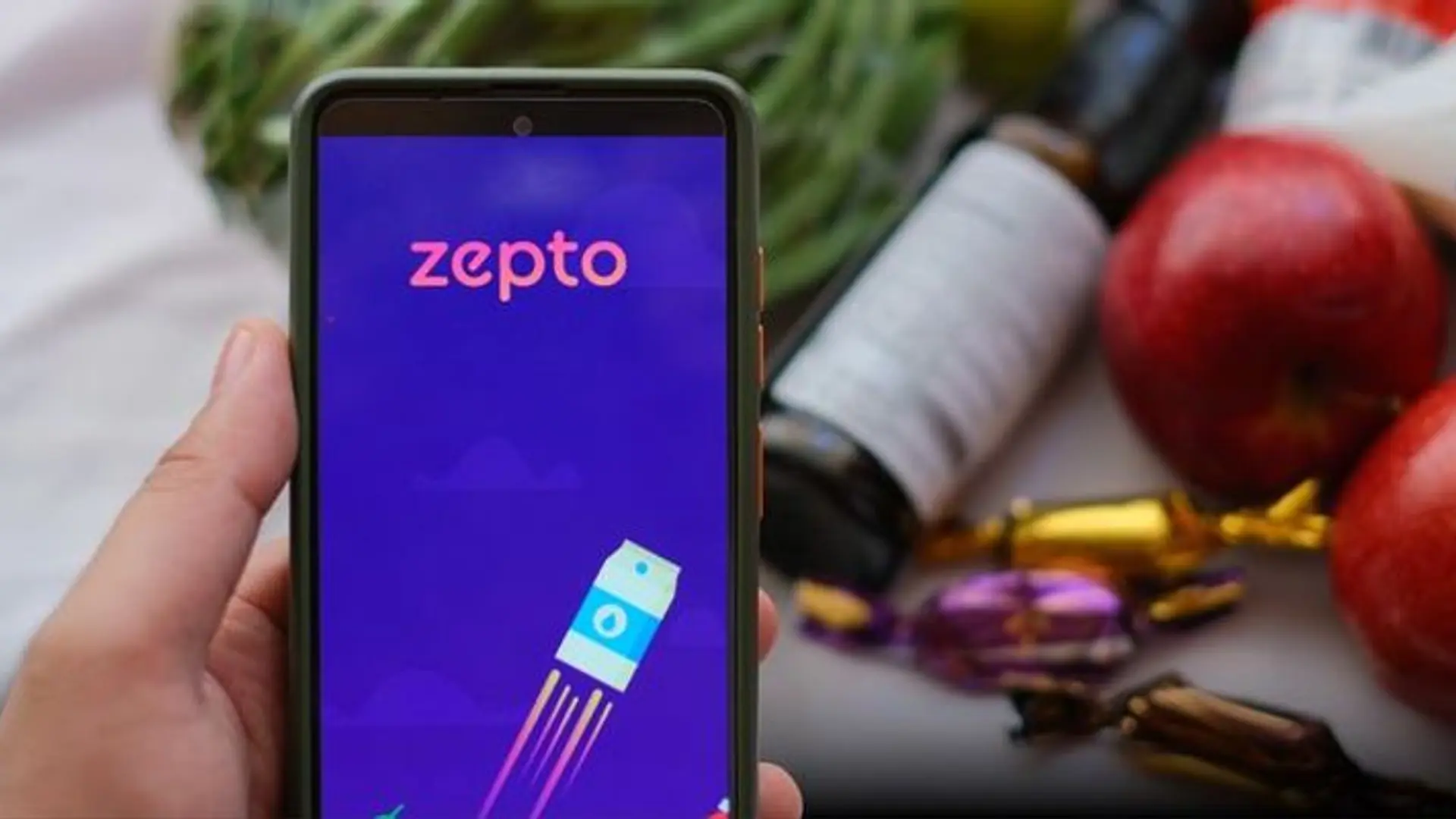Goli vadapav is proud to be a ‘Made in India’ brand
Patriots come in all shapes and sizes. Venkatesh Iyer (Venky), Co-founder of Goli Vadapav , found it disturbing that he did not have any Indian brand in the list of products he consumed on a daily basis. “I would start my day with Colgate toothpaste, Gillette razor and Lux soap. And I would think, why can’t we have an Indian brand among this,” says a note posted on Goli Vadapav’s site. So the gutsy entrepreneur decided to do his bit by building something every Indian can be proud of.

Launched in 2004, in Kalyan – a suburb near Mumbai, Goli Vadapav has come a long way in making that thought a reality. YourStory caught up with the Founder for an inside view into the making of ‘the’ humble vadapav.
The Start
Venky and Co-founder Shivadas Menon are self-confessed foodies who had decided early on that food would be their way to glory. Both knew each other for a while as they had also run a finance venture together. Once they had decided the category, the actual product choice was tougher. While Indian fast food options are plenty, to choose a product that could be mass produced in minimum time was a tough decision.
They chose vadapav because of the convenience it offers to make, deliver and eat. “In 5 minutes you can make 5 vadapavs, but you can’t make 5 masala dosas in 5 minutes. It’s a finger food, so you don’t need a plate, spoon or table. It’s a mobile food which you can drive and eat, or hang in a bus and eat,” explains Venky. The inspiration that Goli drew from McDonald’s and the burger is not lost on anyone. And while there is a lot of a similarity between the two, Goli has written many new rules on its way to our hearts.
Venky and Shivadas started with their own investment and the conventional way of hiring a cook and other staff. However, this model presented them with many problems initially: from wastage, pilferage and even the risk of shutdown, in case the cook decided to move out. This unpredictability didn’t go down well with Venky and he started looking for solutions. Help came from a friend, who was heading the processed foods business of a US company that supplied frozen vegetables and chicken patties to McDonald’s in India. And thus vadas started getting automated – machines helped make standard sized and shaped vadas. Thanks to this investment in technology, Goli overcome three big problems in a single shot – of wastage, pilferage and standardization.

Today, Goli has a central manufacturing capacity from where vadas are prepared and shipped across the country. Their technology enables vadas to be stored in a frozen form and sent every 2 or 3 days to the actual shops, where they are again stored properly. This has made it possible for the Goli vadas to have a shelf life of as much as nine months. “Standardisation and technology has helped us create a model which can help everyone, otherwise if a Delhi businessman takes our franchise and he was to do local sourcing and production, there would be price fluctuations in 6 months, and different kinds of problems may arise. But now that is not an issue, as the supply is done centrally,” explains Venky.
This approach is also what has helped Goli grow aggressively to have 277 stores across 61 cities, while other Indian foods chains like Saravana Bhavan and Haldiram’s still have lower double digit stores. Venky says the dependence that the other stores have on human capital has restricted their ability to grow.
With the product perfected, Venky and Shivadas started looking for options to setup shop. Real estate in Mumbai is pricey and therefore they hit upon a novel idea to use Aarey milk booths to double up as Goli outlets. The acquired 350 Aarey milk booths and at a shot, 350 Goli stores were opened. However, political trouble and disagreement between the booth owner and political parties cut short this dream, and all Goli outlets had to down the shutter. As a result they also lost the first round of funding money. “That was a very tough time, and people thought Goli was finished. All our money was finished and then immediately Lehmann brothers also happened, so no investor was willing to put their money. But Goli vadapav sailed through the crisis. The Nasik store happened and we grew across India,” shares Venky.
“We have had many challenges, but if there are no challenges in your business you will not grow. So pilferage, wastage was a challenge, fund-raising was a challenge, then real estate was a challenge, then because of the political situation we got wiped out and had to move out of Mumbai, but then we found place in Nasik and that was evolution. No doubt things were tough, but that is how business evolves,” he philosophizes.
The Middle
Moving into Nasik was a blessing in disguise, because not only did it give the business a fresh lease of life, but also defined the future expansion strategy for Goli. As a company, they first entered Maharashtra and consolidated there, they next went to Karnataka and saturated it, now they will move to Chennai, UP and so on. Maharashtra now has 85 stores, Bangalore has 80 stores, and the entire Karnataka has 100 stores. They recently started their Kolkata store about two months back and also have a store each in Kochi and Gorakhpur.
Today, Goli sells 70,000 vadapavs daily, and even the recently opened Kochi outlet has Rs 15,000 cash collection per day, claims Venky. “We got into the market where there was no competition; no one sold vada pav in Bangalore, Auragabad, or Nagpur. So we went into territories where vadapav was only heard of, but it was not available there. Plus we are a hygienic store, integrated backend, and fully automated like the Americans,” he says. Venky rationalizes this strategy of entering unknown territories by saying that a Dominos will not sell pizza in Italy or McDonald’s has also moved beyond the US to sell its burgers, because locally the food is available at every place and doesn’t have that much ‘pull’ value.
Venky says that all the franchise expansion has happened because people had heard of Goli, eaten it and then wanted to start it in their city. “Someone ate in Nagpur and started it in Aurangabad; someone ate it in Aurangabad and started it in Dhuliya and so on. So the franchise took us to those cities and we believe in their knowledge of the local market there,” explains Venky.
Goli has followed the strategy of being located in high streets and main market places because such places have the maximum crowd. “Every city has got its flash point -- the centre of that city. We want to first look at high streets where people are moving, because vadapav has to become part of the city’s culture, it has to be a place where people are day in day out – outside their home, offices and colleges. Suddenly if I put it in highways or malls, where people go once in 3-4 months, food habits will not be formed,” reasons Venky.
The Future
With food habits formed and brand established, Goli is now on its way to experimentation. They have introduced items like Sabudana vada, palak-makai vada and masala vada to cater to local demands. Sabudana vada played an important role when Goli went into interior Maharashtra some 5-6 years back. During the Shravan month, most Maharashtrians observe fasting and they eat a lot of sabudana vada. During this period, sales of vadapav plummeted and sabudana vada became the savior that kept numbers ticking.
“If sabudana vada is a fasting food in Maharashtra, in Indore and Bhopal people eat the product because they like it very much. Some people in some parts of the country take sabudana vada as a 5-star delicacy,” says Venky. The palak-makkai vada is very popular in Bangalore and was born out of Café Coffee Day’s corn spinach sandwich. Masala vadapav is very popular in the North, as it has samosa filling in it.
Other food innovation introduced by Goli is the dabba – the equivalent of a combo meal. Targeted at college and office parties, these dabbas contain a vadapav, a nugget (either a hara bara kabab or aloo chaska) and a brownie as the sweet dish. Venky says they are also thinking of introducing family packs of vadapavs, which would have 20 vada pavs in a dabba, something similar to the family pack concept in icecreams. The dabba idea is geared towards the bulk sales concept and was introduced about six months back.
Goli is a profitable company today and will be touching revenues of Rs 45 crores this year. Venky claims there are many enquiries from abroad like Dubai, the UAE and the UK, but they think there is much more to be done in India itself. “If Subway and McDonald can be 8,000-10,000 outlets, then we can be at least 5,000 outlets in India. Even if we setup 1,000 of those stores in the next 5 years, we will have covered much ground. India is a huge land of opportunity,” he emphasizes.
Venky is also bullish about the possibility of making a mass brand out of other Indian food items, if some technology can be built to take care of the wastage, pilferage and standardization. “Anything that has to be done in mass needs technology, and an idli-vada chain can happen only with technology. If a food business is dependent on cooks, it is not viable. India’s food story has not yet started; we are pioneers in the food story here. We may have followers and it will be great to have more. There is a huge opportunity in the food space in India,” says Venky.
Website : Goli Vada Pav
Read about : Jumbo King, another vada pav brand
And Mukunda Foods have developed an automatic dosa making machine







